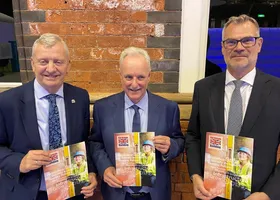
Experienced regional economist Dr Steve McCabe and construction expert Mike Leonard have produced the Build Back Better: Covid-19 Economy Recovery Plan which features a blueprint for a safe return to construction, a set of recommendations to help stimulate demand for new homes and home improvement, and details on how to build essential infrastructure and train a new generation of skilled workers – acting as a catalyst for growth and delivering income for HMRC.
The plan, which follows a clear instruction from Prime Minister Boris Johnson that those in construction and manufacturing should now return to work, also calls on the Government to stand by its commitment to “do everything it takes” to fight the virus and support the UK economy, by investing £11.27bn in a wide reaching programme, designed to create mass employment and produce a £33 billion return.
Authored by Birmingham City University’s Dr Steve McCabe, Associate Professor at the Institute for Design and Economic Acceleration and Mike Leonard, Visiting Professor of Manufacturing and Construction and founder of the Get Britain Building campaign, the hard-hitting and wide-ranging plan brings together all sectors of the construction industry for a solution-led approach.
Recommendations and observations in the plan include:
• A phased return to work following specific guidelines can ensure the protection of construction sites during pandemic
• Small house builders, often highly efficient and providers of local employment and procurement, must be given encouragement
• Address fuel poverty through direct intervention by local authorities using local companies
• Construction can offer long term skilled employment opportunities that can act as a catalyst in achieving inclusive economic growth
• Provide incentives and highlight environmental benefits for consumers to replace inefficient and outdated gas boilers
• 30,000 new social houses built per year for the next three years will address living standards, mobility and some shortfall
• Proposed Building Regulation changes should be delayed in light of exceptional circumstances posed by pandemic
• Construction must be made more attractive as a career choice to young people through regional marketing campaigns
Of particular focus in Build Back Better: Covid-19 Economy Recovery Plan are SMEs, who dominate the sector, with a suggestion that UK Plc fully engages such businesses in order to build the infrastructure and new homes the UK needs, alongside investments to deal with fuel poverty and the upgrading of existing housing stock to meet the net zero 2050 obligations.
McCabe and Leonard – both based in the UK Midlands, an area KMPG has assessed as likely to be worst hit economically by the pandemic - also make strong recommendations to delay the introduction of non-safety related building regulations and provide a range of incentives to stimulate consumer demand, accelerate training and increase apprenticeship opportunities.
Mike Leonard, who is also CEO of Building Alliance, said, “History tells us that the construction industry is the tried and tested solution to drive economic recovery, not least due to the fact we manufacture the vast majority of building materials in the UK which provides resilience, skilled jobs and fast returns on investment. The upstream and downstream jobs in manufacturing, architecture, planning, engineering, distribution and construction, creates an unrivalled multiplier that can achieve inclusive growth, building back better and helping to rebalance our economy. Saving lives must remain our priority but we now have the signal to begin to safely unlock and begin the long path to economic recovery. Construction and the building materials manufacturers are now returning to work with the proper safeguards in place. We must now “Get Britain Building” and “Get Britain Working” delivering the scale of economic multiplier the county needs to bounce back stronger.”
Research carried out in 2018 by Birmingham City University and The Building Alliance calculated that building 300,000 homes a year using, as much as possible, British-made building materials and local builders, would generate an economic ‘uplift’ of more than £90 billion for the UK.
Dr Steve McCabe said, “Covid-19 has resulted in the loss of over 50,000 lives. The Government, quite rightly, locked the nation down to reduce the spread of the virus. However, recently published ONS (Office for National Statistics) data for GDP (Gross Domestic Product) in March clearly demonstrates that effectively closing down the economy through 'lockdown' has caused profound economic shock. It’s estimated that at least £2bn a day is being lost during the pandemic. The overall cost to the UK economy will exceed £300 billion and, depending on the speed of recovery, could be significantly higher. As and when it is safe to do so, a return in construction activity as well as the building materials manufacturing supporting it will underpin a fast and effective way to begin to begin the process of recovery from what is the greatest shock to the UK’s economy in living memory.”
Build Back Better: Covid-19 Economy Recovery Plan is attached for media use.
Ends
Notes to Editor
Issued by Birmingham City University, Press Office.
Tel: 0121 331 6738
Email: press@bcu.ac.uk




















































